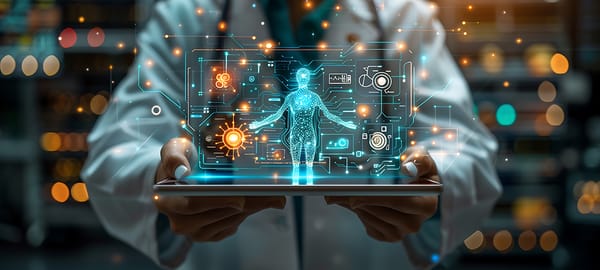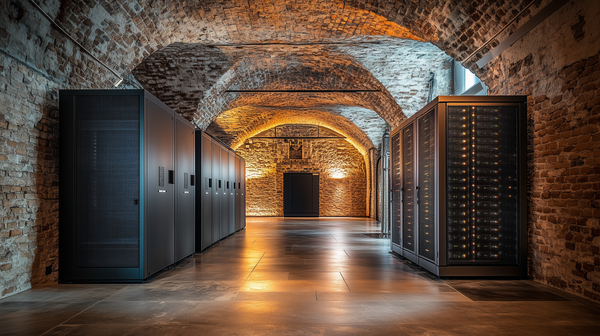Generative AI: The Dawn of a New Era or Humanity's Downfall?

In recent years, few technological advancements have sparked as much excitement and debate as generative AI. Capable of creating text, images (such as the one in this article), music, and even entire virtual worlds from simple prompts, this technology represents a significant leap in artificial intelligence (AI). But like every innovation with far-reaching implications, it raises an age-old question: will generative AI be a boon for humanity, or, as often depicted in movies, could it herald our downfall?
What is Generative AI?
At its core, generative AI refers to algorithms that can generate new content, whether it be images, videos, text, or audio, based on patterns learned from vast datasets. Instead of merely following pre-set rules, these systems use machine learning to analyse vast amounts of data and create something new from scratch, and without human intervention. It's no longer about feeding a machine specific tasks; it's about giving it the capacity to create, mimic, and innovate.
The Case for Optimism: Generative AI’s Benefits
Generative AI holds incredible potential to revolutionise sectors across society, from healthcare to education, the arts, and even our day-to-day lives.
1. Creativity Unleashed
For many, the allure of generative AI is its ability to boost creativity. From assisting artists in crafting unique visuals to helping writers overcome creative blocks, AI can act as a collaborator. Musicians can use AI to compose new melodies, designers can generate innovative architectural plans, and filmmakers can create immersive digital worlds. The technology offers a blank canvas upon which human creativity can flourish, augmenting what we can achieve.
2. Healthcare Breakthroughs
In medicine, generative AI could lead to remarkable breakthroughs. AI algorithms have already shown promise in predicting protein structures, accelerating drug discovery, and personalising treatment plans for patients. These capabilities could reduce the time it takes to develop new therapies, making treatments more accessible to millions of people worldwide.
3. Personalised Education
Generative AI can be a transformative force in education. Imagine personalised tutoring systems that adapt to the unique learning pace and style of each student. Such AI tools could bridge gaps in education, offering tailored lessons, practice exercises, and real-time feedback to students everywhere, regardless of their geographical or socio-economic backgrounds.
4. Automation and Efficiency
In business and industry, generative AI can automate tedious tasks, boost productivity, and streamline operations. Marketing teams can use AI to create targeted campaigns, content creators can automate repetitive editing processes, and researchers can use AI to generate hypotheses and analyse data. The increased efficiency could free up human labour for more strategic, creative, or humane pursuits.
The Dark Side: Generative AI’s Risks
While the potential benefits of generative AI are vast, there are equally valid concerns about its misuse, ethical implications, and long-term impact on society.
1. Misinformation and Deepfakes
Generative AI makes it frighteningly easy to create convincing, but entirely fabricated content. This technology can be used to generate deepfakes, which are highly realistic but fake videos or images that can mislead viewers. Whether used for political propaganda, blackmail, or spreading disinformation, these AI-generated forgeries could undermine trust in the media, erode democratic institutions, and fuel social unrest.
2. Job Displacement
Automation has always been a double-edged sword. As generative AI becomes more proficient in tasks once considered the domain of humans, such as writing, designing, and even coding, the fear of widespread job displacement looms large. While new roles may emerge in the AI-driven economy, many fear that the transition could leave large segments of the workforce unprepared or unemployed, exacerbating inequality.
3. Ethical and Moral Dilemmas
Who is responsible for content generated by AI? If an AI model produces a harmful, offensive, or illegal output, where does accountability lie? Additionally, biases in training data can lead AI to reproduce or even amplify societal prejudices, leading to discriminatory outcomes. The Netflix documentary "Coded Bias" explores this issue. These ethical challenges demand new regulations, guidelines, and societal norms, but the speed of AI advancement often outpaces the creation of such frameworks.
4. Loss of Human Touch
As AI becomes increasingly proficient at generating art, music, literature, and even human-like conversations, there's a risk that society might lose its appreciation for human creativity and labour. While AI can mimic styles, tones, and structures, it lacks the personal experiences, emotions, and nuances that give human creations their depth. The fear is that we might begin to value efficiency and output over the human spirit embedded in artistic and intellectual endeavours.
The Path Forward: Balance and Caution
The future of generative AI doesn’t have to be black or white. Its development and integration into society will likely involve both beneficial and harmful consequences, and much will depend on how we choose to harness this technology.
1. Ethical AI Development
To prevent generative AI from becoming a tool for harm, it is crucial to embed ethics at the heart of AI development. Transparency in AI models, bias mitigation, and strict regulations around the misuse of AI (such as in deepfakes) will be essential. Policymakers, tech developers, and ethicists must work together, globally, to ensure AI serves the public good.
2. Education and Workforce Adaptation
Rather than view AI as a threat to jobs, society must focus on reskilling and education. New generations of workers will need skills that complement AI rather than compete with it. By prioritising lifelong learning and encouraging human-AI collaboration, we can minimise disruption and harness the benefits of automation.
3. Augmenting, Not Replacing, Human Creativity
Generative AI should be seen as a tool to augment, not replace, human creativity. As with previous technological shifts, humans will need to adapt, finding new ways to express creativity and leveraging AI to enhance our capabilities rather than fear its encroachment into the creative domain.
Conclusion: Tool or Threat?
Whether generative AI becomes a blessing or a curse largely depends on how humanity chooses to wield it. It has the potential to be a powerful force for good, driving innovation, creativity, and progress in countless fields. However, unchecked, it could also lead to societal challenges, ranging from job displacement to the erosion of trust in digital content.
Let's not forget that some of the world's most influential scientific voices have raised serious concerns about the unchecked advance of generative AI! A stark reminder that humanity must maintain strict controls over the evolution and capabilities of AI.
In the end, it’s not AI itself that will decide our future, but how we choose to use it. By approaching generative AI with both optimism and caution, we can work towards ensuring it becomes a tool for human flourishing, rather than a harbinger of our downfall.




